HRTS eNews - 03/23/2009 (Plain Text Version)
In this issue:
HRTS News
•
HRTS Next: Broadcasting Reality
•
The Cable Chiefs 2009 Event Recap
HRTS Online
•
Job Board, Video and Searchable Roster featured on new website!
From the Executive Director
•
Aloha! Greetings from Hawaii
Member Profiles
•
Ali LeRoi
•
Franz Kurath
Member News
•
Welcome New Members
JHRTS
•
JHRTS News & Announcements
About HRTS
•
Officers, Board of Directors, Staff
The Cable Chiefs 2009 Event Recap
Predicting an unpredictable world
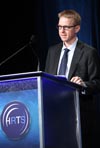 by Chris Davison, chris@lthmedia.com†
by Chris Davison, chris@lthmedia.com†
HRTS President Kevin Beggs opened the Cable Chiefs panel on March 4th, 2009 by encouraging HRTS members to participate in the new mentoring programming being done in conjunction with the JHRTS, a program that will help shape and guide the next generation of leaders in our industry. Beggs next recounted how much the cable industry has changed in the past few years, as represented in the diversity of the dayís panelists: Doug Herzog, President, MTV Network Entertainment Group; Rich Ross, President, Disney Channels Worldwide; Henry Schleiff, President and Chief Executive Officer, Crown Media Holdings, Inc., Hallmark Channel and Hallmark Movie Channel; Jeff Shell, President, Comcast Programming Group; and Andrea Wong, President and Chief Executive Officer, Lifetime Networks. The panel was moderated by Rod Perth, Co-founder of ReelzChannel and past HRTS President.
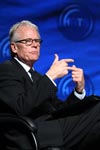 Perth began by recounting a Board meeting he had when he was running USA Networks while at the same time serving as HRTS President, at the meeting Perth suggested an HRTS luncheon for cable toppers and nobody thought it would work. Fast forward to today and the very successful annual Cable Chiefs luncheon with a group of top executives all enjoying a dual revenue stream, a group that Perth said showed optimism in a time of significant challenges.
Perth began by recounting a Board meeting he had when he was running USA Networks while at the same time serving as HRTS President, at the meeting Perth suggested an HRTS luncheon for cable toppers and nobody thought it would work. Fast forward to today and the very successful annual Cable Chiefs luncheon with a group of top executives all enjoying a dual revenue stream, a group that Perth said showed optimism in a time of significant challenges.
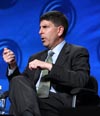 The first question to the panel dealt with DVRs and their impact as ad-skipping devices. Jeff Shell said that he thinks DVR is a subset of the larger issue of On-Demand, going on to add that this is a double-edged sword, where on the one hand people are skipping more ads but on the other hand, people are watching more content and this is good for content producers. Shell also pointed out that that DVR impact may be overstated since people have always skipped ads, by changing the channel with the remote, getting up and going to the bathroom, and other traditional means.
The first question to the panel dealt with DVRs and their impact as ad-skipping devices. Jeff Shell said that he thinks DVR is a subset of the larger issue of On-Demand, going on to add that this is a double-edged sword, where on the one hand people are skipping more ads but on the other hand, people are watching more content and this is good for content producers. Shell also pointed out that that DVR impact may be overstated since people have always skipped ads, by changing the channel with the remote, getting up and going to the bathroom, and other traditional means.
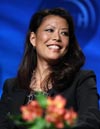 Perth asked Andrea Wong what she is doing proactively to convince advertisers that they should invest in Lifetime. Wong said that itís all about brands, and you do get a CPM value for your brand, for Lifetime offering the #1 and #2 networks for women. She said that Lifetime offers a 360 degree platform to reach women, a full and complete package that includes Lifetime television networks as well as their online and mobile presences. Wong also added that product integrations are a way forward, such as in Lifetimeís upcoming series ďManeaterĒ that features organic integrations with Unilever brands.
Perth asked Andrea Wong what she is doing proactively to convince advertisers that they should invest in Lifetime. Wong said that itís all about brands, and you do get a CPM value for your brand, for Lifetime offering the #1 and #2 networks for women. She said that Lifetime offers a 360 degree platform to reach women, a full and complete package that includes Lifetime television networks as well as their online and mobile presences. Wong also added that product integrations are a way forward, such as in Lifetimeís upcoming series ďManeaterĒ that features organic integrations with Unilever brands.
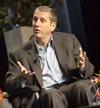 Doug Herzog was asked about interactivity and its appeal to advertisers. Herzog said that there was a time when the programming guys did their thing and the marketing guys did their thing but today everyone is working much more closely with one another, allowing viewers to engage and interact with advertiser brands. He added that while there are some challenges that this is an industry full of some of the most brilliant, creative people in the world and so he goes to bed at night feeling like theyíll figure it out.
Doug Herzog was asked about interactivity and its appeal to advertisers. Herzog said that there was a time when the programming guys did their thing and the marketing guys did their thing but today everyone is working much more closely with one another, allowing viewers to engage and interact with advertiser brands. He added that while there are some challenges that this is an industry full of some of the most brilliant, creative people in the world and so he goes to bed at night feeling like theyíll figure it out.
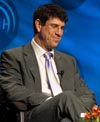 Perth next queried the panel about online viewing and Jeff Bewkesí idea of ďTV EverywhereĒ, watching television programming on TV, online, on mobile. Rich Ross said that if you brand well so that people know what you are producing and people know that you have an economic model that you can exploit beyond just the TV set, then that tail is what makes it profitable and not just the original viewing. Ross added that if people donít know who makes it and what it is, then it just goes onto television and into thin air in terms of value. Perth responded that he doesnít think that people watch brands, they donít watch something just because itís Disney or HBO, leading Schleiff to say that he completely disagrees.
Perth next queried the panel about online viewing and Jeff Bewkesí idea of ďTV EverywhereĒ, watching television programming on TV, online, on mobile. Rich Ross said that if you brand well so that people know what you are producing and people know that you have an economic model that you can exploit beyond just the TV set, then that tail is what makes it profitable and not just the original viewing. Ross added that if people donít know who makes it and what it is, then it just goes onto television and into thin air in terms of value. Perth responded that he doesnít think that people watch brands, they donít watch something just because itís Disney or HBO, leading Schleiff to say that he completely disagrees.
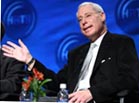 Schleiff added that the hows and wheres of technology are less important to content creators who ultimately compete on brand, itís brand that distinguishes one network from another. He also said that one issue with the increasing number of online viewing options is the amount of noise out there, that there are so many choices it can be overwhelming to consumers. Schleiff got a big laugh when he added that a well-established brand offers reassuring predictability for people living in a world of unpredictability, where one day you have a job and the next day itís gone, one day you have money and the next day itís gone, one day you eat peanut butter and the next day youíre gone.
Schleiff added that the hows and wheres of technology are less important to content creators who ultimately compete on brand, itís brand that distinguishes one network from another. He also said that one issue with the increasing number of online viewing options is the amount of noise out there, that there are so many choices it can be overwhelming to consumers. Schleiff got a big laugh when he added that a well-established brand offers reassuring predictability for people living in a world of unpredictability, where one day you have a job and the next day itís gone, one day you have money and the next day itís gone, one day you eat peanut butter and the next day youíre gone.
All present agreed that the outlook is positive since more people are watching more media across more platforms. This increased consumption is better for the consumer, itís better for the advertisers and therefore itís certainly better for programmers. Cable networks have grown to become trusted, focused brands that offer predictability in an unpredictable world.